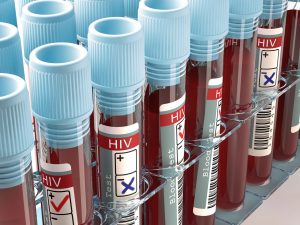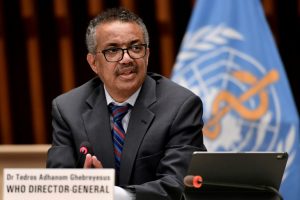Tucked inside a vast residential area in the Jabi district of Abuja, the capital city of Nigeria, the first officially registered medical clinic in this West African country offers integrative medicine to local patients, incorporating traditional Chinese medicine, U.S. alternative medicine and Western medicine.
The health facility, named the Eastern and Western Hospital, was founded by a Chinese couple in 2017 to provide adequate solutions to people’s health problems by embracing Eastern and Western medical treatments.
For example, the hospital offers acupuncture and other Chinese natural therapies such as moxibustion, vacuum cupping, medical massage, chiropractic adjustment and Chinese herbal medicines.
For nine years, Aisha Dogo, a Nigerian civil worker, had chronic back pain which had made her seek medical treatment in many local and foreign hospitals; however, they were unable to solve her problem.
The unending pain, caused by spinal compression, is often treated in two steps – painkillers at first and then surgery. For Dogo and many other patients across the world who are suffering from spine problems, the pain may still return even after surgery.
Just as Dogo was about to lose hope for a permanent cure, she happened to read about the Eastern and Western Hospital on the Internet, and learned how it had become a Mecca of sorts for ailing people living in the most populous African country.
“The main reason why I came here is that I have gone to several hospitals and had several treatments without a permanent solution to my problem. I was always on (oral) medications,” Dogo told Xinhua during one of her bi-weekly appointments at the facility.
“My experience here has been good. It is a therapy, and it has been working slowly and steadily,” she said, referring to the physiological, pathological, diagnostic, syndrome differentiation, treatment, and health-preserving aspects of traditional Chinese medicine.
“I came here with a lot of problems, and so far I am grateful that I am getting better,” Dogo said, recalling her first visit to the hospital less than two months ago.
The difference between Eastern and Western medicines, according to U.S.-trained medical doctor Muhammed Ibrahim, is that Western medicine is more familiar with healthcare as a model of healing or a mode of correcting an illness, while traditional Chinese medicine focuses more on prevention and health maintenance.
Over the years, a lot of Nigerians have learned about traditional Chinese medicine but demand for it has just increased recently, with many patients realizing that it mainly emphasizes taking care of one’s body.
Andy Yuan, a Chinese doctor who founded the hospital together with his wife, told Xinhua that when it opened two years ago, the health facility had only one patient per day. But now, the number of registered patients has risen to over 2,500, with hundreds of them coming from other cities across Nigeria.
“I decided to come to Nigeria because people needed our services. Here, there are many avenues for Western orthodox medicine, but the need for Eastern alternative medicine and traditional natural therapy is huge, as people want their body to be well-maintained,” said Yuan, the first fully accredited Chinese doctor in Nigeria.
Having an educational background in both Western medicine and traditional Chinese medicine, Yuan said he and his wife deliberately combined Eastern with Western treatments “in order to achieve better results” as each had its own limits.
“Many Nigerians like Chinese traditional medicine. They have been looking for it for a long time. They surf the Internet to search for us. When they get here they get excited because it is real Chinese people practicing Chinese medicine,” he said.
Although some Nigerians still doubt its efficacy, overall characteristics and the concept of traditional Chinese medicine, more and more people are willing to experience it.
Umar Ibro, an official of the State Universal Basic Education Board in Abuja, who is also a patient at the hospital, said he was initially scared of acupuncture, as he had seen pictures and videos of people being pricked with needles all over their bodies.
“Honestly, it is the best experience I have ever had. My first contact with acupuncture was more than 20 years ago when a friend of mine talked to me about his experience in China,” Ibro said.
Describing his acupuncture experience so far as “wonderful”, Ibro believed there’s a science behind it and not voodoo as some Africans believed.
“It is real and helps the entire body to function well,” he said.
Acupuncture, among the many therapies of traditional Chinese medicine, has not only become the most attractive one to Nigerian patients, but also fascinates experienced medical doctors.
Okosun O’Casey, a doctor at the Eastern and Western Hospital, said although he was originally employed to practice Western medicine, it was difficult not to add Chinese medical treatments because there are still some aspects of patient management that Western medicine does not yet have answers to.
“There are some conditions that are better treated in the Eastern medicine way and some are better treated in the Western medicine way. I think the meeting point is what is more important here,” O’Casey said.
In the eyes of U.S.-trained chiropractor Rantiola Ogun, the hospital is unique among other facilities in the country.
“Traditional Chinese medicine goes hand in hand with the philosophy of chiropractic because its main thrust is that the body should always be in a state of good health,” Ogun said.
Source: GNA






